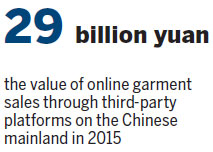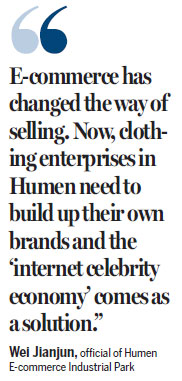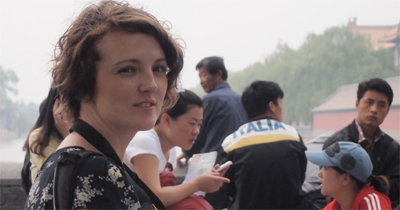|
A woman tries out a dress in a VR (visual reality) fitting room in Zhengzhou, Henan province. Many online commerce giants are introducing VR fitting rooms to help improve customers' shopping experience. Online commerce has also fired the imagination of the traditional garment industry. Provided to China Daily |
Competition in the traditional garment industry in Humen town, in Dongguan city, Guangdong province, known as a clothing manufacturing hub, has been intensifying as clothing enterprises rush to pour money into e-commerce platforms to boost sales after being hard hit by online shopping.
A growing number of such enterprises are embracing the emerging "internet celebrity economy" in order to seek a new life.
Internet celebrity, or wang hong in Chinese, refers to a growing number of people who have become famous on the internet. They post dressing photos and videos, recommend cosmetic products and share interesting things with tens of thousands of, or millions of fans on Weibo - the Chinese version of Twitter - instant massaging tool WeChat and other social-networking platforms.
Many wang hong run online stores on Taobao - Alibaba's online marketplace - selling fashionable clothes. By posting dressing photos and videos on social media, they direct fans to their online stores, trying to turn their fancies into economic benefits.
Zhang Dayi - a top internet celebrity on the Chinese mainland - is followed by more than 4.4 million fans on Weibo. It's reported that monthly sales at her online clothing store, Wuhuanxide Yichu, could reach millions of yuan. Xueli - another popular internet star with 2.5 million Weibo followers - is able to garner more than 200 million yuan ($30.1 million) in revenue a year by operating her Taobao clothing store.
According to Taobao, seven of the Top 10 best-selling women's clothing stores on the platform during the "Double Six" (June 6) promotional activities last year were run by internet celebrities.

In a report earlier this year, Guotai Junan Securities said the "internet celebrity economy" has great potential for growth, with the clothing market driven by the new economy expected to exceed 100 billion yuan.
Analysts and industry insiders say internet celebrities and clothing enterprises need each other as they can offer complementary services by leveraging their own advantages.
Internet stars, who have a large number of fans, have the power to gather a large group of potential buyers, but they lack industry-chain resources to turn their influence into business, says Yang Shengsong, marketing director of Dongguan Yinli Clothing.
"That's what clothing companies can offer. A number of traditional clothing enterprises in Humen, including our company, have already turned themselves into e-commerce sellers. Now, by integrating further into the 'internet celebrity economy', they're able to achieve better growth."
Yang says that although many online stores are investing heavily on e-commerce platforms, such as using substantial funds to secure a good place on Taobao to increase exposure, investment returns are declining.
"The 'internet celebrity economy' brings a new life to us," he says.
The traditional garment industry can easily integrate into the industry chain of "internet celebrity economy" and achieve revival in the process, reckons Lyu Ming, an analyst at Guotai Junan Securities.
According to Yang, Yinli Clothing began cooperating with two internet celebrities, including one in South Korea, two months ago. The internet celebrity, a university student who is studying at South Korea, has tens of thousands of fans on Weibo.

According to Yang, his company's profits have soared by up to 30 percent as the stars have brought more customers to its online stores.
"For 1,000 visitors to our online stores through Sina Weibo, we could receive 20 to 30 orders. That's a very high rate compared with only eight orders for 1,000 visitors coming randomly from other channels," he says.
"And, normally, this group of customers is less sensitive to prices as they come to us because they like our products. The refund rate is also lower."
Wei Jianjun, an official of Humen E-commerce Industrial Park, says that while the transformation to e-commerce shoppers is considered as the "first upgrade" for Humen's traditional garment industry, the emergence of an "internet celebrity economy" can be seen as the "second upgrade".
"E-commerce has changed the way of selling. Now, clothing enterprises in Humen need to build up their own brands and the 'internet celebrity economy' comes as a solution," says Wei.
The owner of another clothing firm in Humen said the new business model has prompted his company to improve product quality and innovate in order to retain existing customers and explore new ones.
"In the past, most of our products were for wholesale, and the quality was poor. Now, we want to build our own brand with the help of internet celebrities. This allows us to improve our production and make better clothes," he said.
Currently, there are more than 8,000 e-commerce clothing enterprises and individual businesses in Humen. Last year, online garment sales through third-party platforms reached 29.5 billion yuan.
sally@chinadailyhk.com
(HK Edition 08/16/2016 page11)
Ian McKellen, who is known as a fine Shakespearean actor and is a six-time recipient of the Laurence Olivier Award, recently came to China for the worldwide activity Shakespeare Lives. But his China tour is much more than that.

One of the potentially most traumatic things a girl has to go through is finding a new hairdresser.